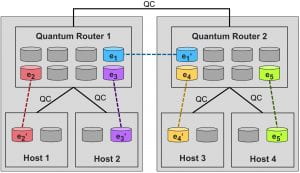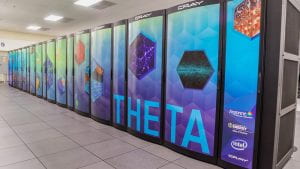1. Software Stack for NISQ Architectures
Solving practical computational problems on quantum computers will require new techniques that map large quantum circuits onto systems with limited connectivity and modest qubit counts, as well as mitigating the effects of noise. Our group has been developing quantum circuit compilation methods that, for example, improve efficiency and fidelity by reducing the number of gates and measurement operations in quantum chemistry and molecular dynamics circuits. We have also been developing theoretical techniques and practical algorithms that allow characterizing and mitigating noise inherent in quantum devices. We have been using qubit testbeds – including superconducting qubits, neutral atom arrays, and ion traps – to demonstrate the benefits of our work.
2. Quantum Communication and Networking
Recent experimental advances make quantum communication networks a reality. The work of our group complements experimental efforts by studying alternative quantum network architectures, designing a suitable control protocol stack, and building a quantum network simulator capable of quickly comparing alternative design choices. Our open-source Simulator of QUantum Network Communication (SeQUeNCe), available on GitHub, performs simulations at the individual photon level with picosecond resolution and integrates accurate models of optical components. The challenges we are addressing include overcoming distance limitations of quantum communication, ensuring sufficient scalability and throughput, supporting heterogeneous quantum information sources and applications, and motivating the role of technological advances.
3. Noisy and Noise-Free Simulation Techniques
Physically motivated simulations of noisy quantum hardware are key to accurate device characterization, providing better understanding of their behavior and more efficient experimental design of these technologies. Noise-free state vector simulations are crucial for benchmarking and understanding the power of quantum computing. We are collaborating with Stephen Gray and Bryan Clark on open quantum system simulations and with the team of Yuri Alexeev and Frederic Chong on noise-free state vector simulations. We develop and implement new techniques to extend the size of systems that can be simulated, such as tensor slicing, matrix product states, and quantum circuit partitioning. We have been using supercomputers at the Argonne Leadership Computing Facility and the University of Chicago Research Computing Center.


